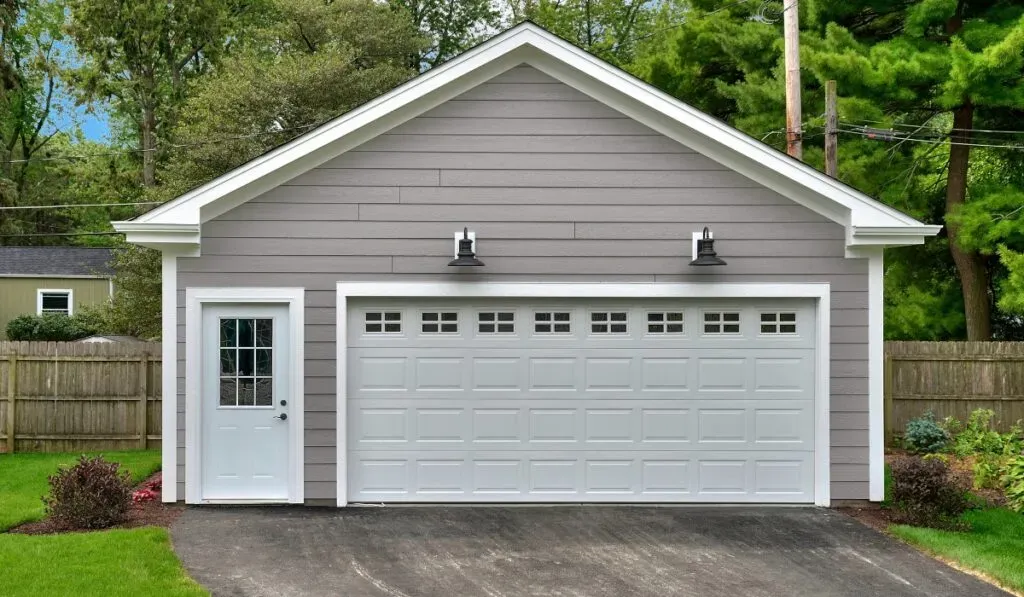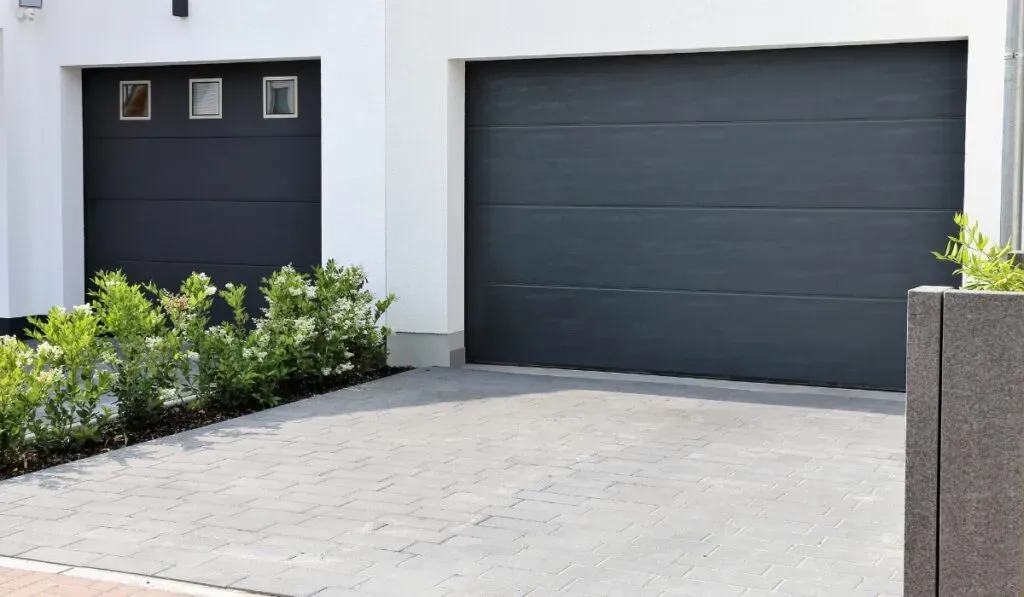
Garage door finish coastal rust prevention is essential for protecting your doors from salt-spray and UV fade effects common in coastal homes, using durable options like powder coat and PVDF/Kynar coatings. Regular maintenance routines and compatible cleaners help maintain fade resistance and corrosion prevention, ensuring long-lasting coastal finishes backed by factory coastal packages and warranty guidelines.
Garage Door Finishes for Coastal Homes: Fade Resistance, Rust Prevention, and Care
Coastal homes deal with some tough stuff. Salt in the air and strong sun can wreck garage door finish over time. Picking the right coastal garage door finish helps fight rust and fading.
Top Coastal Garage Door Finishes
Here are some finishes that work great near the coast:
- Powder Coat Finish:- This finish makes a hard shell on your door. It stops rust and fading. Plus, it handles scratches well.
- PVDF Coating:- PVDF coatings hold color better under bright sun. They have strong UV fade resistance. So, your door looks fresh for longer.
- Anodized Aluminum:- Anodizing makes aluminum tougher. It keeps rust away and looks nice too.
- Wood Alternatives:- These look like wood but don’t soak up water. They won’t warp or rot like real wood does near water.
Benefits of Choosing the Right Finish
Picking a good garage door finish helps you in many ways:
- Stops fading from sun damage
- Prevents rust from salty air
- Needs little care or cleaning
- Makes your home look nicer
Understanding UV Fade Resistance
Sunlight can ruin paint fast if your door has no protection. Choose coatings that resist UV fade well to keep colors bright in sunny spots.
Salt Spray Corrosion Standards
Salt spray from the ocean speeds up rust on metal parts. Look for finishes tested by ASTM B117 salt spray rules. This means they fight corrosion better.
Maintenance Routines
Keep your coastal garage door nice with proper garage door maintenance Newport Beach routines:
- Washing it with mild soap and water now and then
- Avoiding rough cleaners that scratch surfaces
- Checking seals so water doesn’t sneak inside
Doing these simple things helps your garage door last much longer!
Choosing the right coastal garage door finish matters a lot. It fights rust and fading caused by salt air and sunlight. Powder coat finish garage doors or ones with PVDF coating protect your door well. That way, you get a pretty door without fixing it all the time.
Understanding Coastal Challenges for Garage Doors
Homes near the coast face some tough problems with garage doors. Salt air corrosion happens when salty ocean moisture hits metal parts. This makes rust form faster than usual. Also, high humidity keeps things wet longer. That makes rust worse.
Coastal environmental factors like wind can blow salt spray and sand onto doors. Over time, this wears away the finish. The sun’s UV rays also cause damage by fading colors and weakening materials.
Here’s what you should know about protecting garage doors in marine environment garage doors:
- Use coatings made for coastal climate corrosion.
- Pick finishes that block salt air corrosion.
- Keep surfaces dry to reduce humidity effects.
- Clean and inspect doors often.
These steps help keep your garage door safe from environmental exposure protection.
Salt Spray and Corrosion Effects on Garage Door Finish
Salt spray is a big enemy for garage doors near the sea. It speeds up rust on metal parts that don’t have good protection. Manufacturers check this with the ASTM B117 salt spray test. This test sprays salty mist on samples for hours or days to see if they hold up.
Garage doors with salt spray corrosion resistance last much longer near the ocean. Anti-corrosion paint acts like a shield. It stops metal oxidation and keeps rust from starting.
Good materials make a difference too:
- Powder-coated steel
- Anodized aluminum
Both handle saltwater damage better than plain metal.
Adding protective sealants helps even more. These stop rust and keep your door working longer by fighting marine environment damage.
UV Radiation and Fade Resistance Considerations
Sunlight near the coast is strong and full of UV rays. These rays break down paint pigments fast. That makes colors fade quickly on garage doors.
You want a finish with UV fade resistance so colors stay bright longer. UV protective coating includes special stuff that blocks bad rays while keeping color vibrant.
Look for these in fade-resistant paint technology:
- Durable pigments made for outdoor sun
- UV stabilized coatings added during making or later maintenance
Color retention needs regular care too. Reapplying protective layers keeps your door looking fresh despite constant sun exposure along coastal skies.
Importance of Rust Prevention in Coastal Climates
Rust-proofing matters a lot where salty air meets metal every day. Garage door rust inhibitors slow down iron’s reaction with oxygen that causes rust spots and weak parts.
Corrosion protection has two parts:
- Factory-applied coatings
- Sealants added during installation or routine care visits
These help stop rust from ruining panels, hinges, or tracks exposed to sea salts mixed with wind-driven rain.
Don’t forget regular checks! Clean your door using cleaners that won’t harm the finish or break warranties often included in special coastal packages offered by suppliers you can trust.
Top Garage Door Finish Options for Coastal Durability
Picking the right garage door finish matters a lot if you live near the coast. Salt air, humidity, and sun can wear down your door fast. A finish that is tough and lasts long will stop rust and damage. Many factory-applied finishes are made to fight coastal weather. These coatings keep your door safe from corrosion and fading while looking good for years.
Powder Coat Finishes: Advantages for Coastal Environments
Powder coat finishes put a thick, even layer on metal garage doors. This type of finish does not fade easily. It also stops rust from salty air near the ocean. The coating works like anti-corrosion paint to protect metal well.
Here’s why powder coat works great:
- Stops rust in salty coastal air
- Resists salt spray corrosion (meets ASTM B117 test)
- Keeps color bright without fading
If you want a low-maintenance, strong finish on your metal garage door by the sea, powder coat is smart.
PVDF/Kynar Coatings: Superior Protection Against Elements
PVDF or Kynar coatings make high-quality finishes just for rough outdoor spots. They are marine-grade and protect against harsh sunlight well.
What makes PVDF/Kynar special?
- Keeps color from fading under strong sun
- Resists chemicals and moisture so it won’t peel or chalk
- Made to fight salt spray and corrosion
These finishes come from the factory ready to shield your garage door year after year with little work needed.
Anodized Aluminum: A Lightweight and Corrosion-Resistant Choice
Anodized aluminum forms a natural shield against oxidation while staying light. This outdoor metal door finish stops corrosion without heavy paint layers.
Benefits include:
- Built-in corrosion resistance from anodizing
- Weatherproof against salty air
- Easier to care for than painted doors
If you want a simple look with good protection in marine areas, anodized aluminum fits well.
Wood Alternatives: Achieving the Look Without the Maintenance
Wood alternative garage doors look like real wood but don’t have wood’s problems. They don’t warp or rot from moisture. These non-wood doors use synthetic wood finishes made to last near the coast.
Why pick wood alternatives?
- Resist cracking, swelling, or bug damage in humid spots
- Need less painting or sealing than real wood
- Offer true wood style with longer life
Synthetic wood finishes give you nice looks plus less worry about coastal weather damage.
Selecting the Right Finish: Factors to Consider
Picking the right finish for your coastal garage door really matters. Salt air and moisture can damage it fast. When you order, look for a factory coastal packaging or a factory coastal package. These come with special coatings that fight rust and corrosion near the ocean.
Factory finish options often include powder coat, PVDF/Kynar, or anodized aluminum. These finishes protect well against salt spray. Some places offer factory coastal upgrade options too. These add more layers to stop corrosion and block UV rays.
Choosing a finish like this helps your door last longer. It also means you won’t have to fix or paint it often.
Salt-Spray Standards (ASTM B117): What to Look For
The ASTM B117 salt spray test shows how well a coating fights salty air damage. When you pick a garage door finish, check if it passes this test. This is an industrial coating standard for salt spray corrosion resistance.
Marine-grade coatings pass tough ASTM B117 tests. They can handle hundreds of hours in salty fog without rusting or peeling. Coating datasheets often show these test results. That way, you can compare different products easily.
Using finishes tested by ASTM B117 means your door will stand up better against salt air corrosion near the ocean.
Assessing UV Fade Resistance for Long-Lasting Color
UV fade resistance keeps your garage door’s color bright even under strong sun. Look for fade-resistant paint technology like PVDF/Kynar or powder coats with UV protective coating.
UV stabilized coatings block harmful UV rays. They slow down color fading over time. This keeps colors looking good in sunny coastal spots.
Check if the maker follows fade protection standards. Also, ask for info on how long the color lasts before you choose your finish.
Evaluating Warranty Caveats and Coverage
Coastal spots are hard on garage doors, so read warranty caveats well before buying. Coastal door warranties might limit coverage based on how much sun or salt the door faces.
They may require certain care steps or cleaning rules too. Using wrong cleaners or skipping upkeep can void the warranty.
Study warranty details carefully to know what might cancel coverage. A clear garage door warranty for coastal conditions protects your buy—but you must follow all rules to avoid surprise costs later on.
Maintenance Routines for Coastal Garage Door Finishes

Taking care of your garage door near the coast means fighting rust and salt damage. Salt in the air can wreck your door’s finish fast. But cleaning and checking it regularly helps keep it looking good and working well for a long time.
Regular Cleaning: Compatible Cleaners and Techniques for Salt Removal
Salt from sea air can make garage doors rust faster. So, you need to clean the door often. Use cleaners made for garage doors that won’t hurt the finish. Stay away from strong chemicals that can strip off the protection.
- Pick mild soap or special garage door cleaners.
- Wash off salt with plenty of fresh water.
- Clean every 1 to 2 months if you live near salty air.
- Dry the door well after washing so water doesn’t sit there.
These steps help stop salt spray corrosion. They also keep powder coat or PVDF finishes from fading too quick.
Inspecting for Early Signs of Corrosion and Damage
Look over your door regularly to spot rust early. Rust usually starts on edges, hinges, seams, or bottom parts.
Watch out for:
- Tiny rust spots or color changes
- Paint bubbling or peeling off
- Rough spots where the coating breaks down
Finding rust early lets you fix it fast before it spreads. Even if your door has corrosion-resistant parts like anodized aluminum, check it often.
Importance of Timely Repairs to Preserve Finish Integrity
Fix chips, dents, or scratches quickly. This stops salt air from getting to metal under the paint. Use touch-up paint or sealants to cover any damage.
If you wait too long, rust can get worse and mess up how the door looks and works, potentially requiring garage door panel replacement Newport Beach services. Keeping up repairs helps protect your warranty if you have a coastal package.
24/7 Garage Door Repair: Addressing Coastal Garage Door Challenges
Coastal homes deal with salty winds and high humidity that wear down garage doors fast. If your door breaks or gets damaged, call pros who know coastal conditions for emergency garage door repair Newport Beach services. They offer repair any time—day or night—to keep your door safe and rust-free.
Doing regular cleaning plus fast repairs keeps your garage door working longer even in salty seaside places.
Extending the Life of Your Coastal Garage Door
A strong garage door finish helps your coastal home stay durable and long-lasting. Salt in the air, wet weather, and bright sun can make doors rust or wear down fast. You want a corrosion-resistant finish that’s weatherproof. That kind of coating keeps the door safe from rough coastal weather. Factory coastal packaging adds even more protection. It uses special coatings made to fight salt spray. This helps your garage door last longer and keeps your home looking nice.
Here are some key points:
- Garage door finish needs to block salt, moisture, and sun.
- Corrosion-resistant coatings stop rust from forming.
- Weatherproof finishes hold up better over time.
- Factory coastal packaging gives an extra layer of defense.
- All this improves exterior door longevity.
Applying Protective Coatings and Sealants
Protective sealants help keep your garage door safe from rust. Anti-corrosion paint or marine-grade coatings build a strong shield. They stop salt damage and wetness from getting in. These protective garage door treatments often have corrosion inhibitors that slow rust down. You should put on sealants regularly to stop peeling or cracking.
Here’s what you should know:
- Protective sealants block moisture and salt.
- Anti-corrosion paint fights rust.
- Marine-grade coatings handle tough seaside conditions.
- Corrosion inhibitors slow down rust growth.
- Reapply sealants often for best results.
The Role of a Factory Coastal Package for Enhanced Protection
A factory coastal package means the door comes with special finishes made at the factory for beach areas. This package can include thicker powder coats or layers like PVDF/Kynar that resist salt spray well (they meet ASTM B117). Choosing this during new garage door installation with factory coastal packages makes sure the finish is done right every time. Field painting just can’t match it. Factory coastal upgrades help your garage door last longer and need less fixing later.
Important facts about this:
- Factory coastal package has factory-applied finish.
- Uses stronger coatings designed for salty air.
- Offers options like thicker powder coat or PVDF/Kynar layers.
- Meets strict salt-spray testing standards.
- Helps reduce future maintenance.
Leveraging Coating Datasheets for Best Practices
Coating datasheets tell you how each finish works in different conditions. They show info like how much UV fade resistance a coating has, which cleaners you can use safely, and how long it lasts near the ocean. Reading these datasheets helps you pick the right cleaning stuff without hurting your garage door’s finish.
Things to check on datasheets:
- UV fade resistance level.
- Cleaner compatibility (what won’t damage the coating).
- Expected durability in marine settings.
- Proper care and maintenance tips.
Importance of Follow-Up Photos for Tracking Finish Performance
Taking follow-up inspection photos every 2 to 3 years lets you watch how well your garage door finish holds up by the coast. Pictures catch fading, chipping, or rust before things get worse. Keeping these records also helps if you need to make warranty claims because of early wear or defects.
Why take photos?
- Track fading, chipping, or corrosion early.
- See how well protective coatings work over time.
- Help with warranty claims if needed.
- Keep a visual history of your door’s condition.
